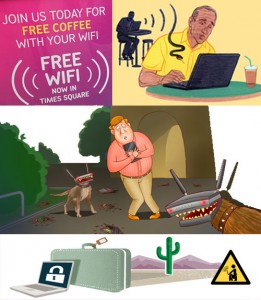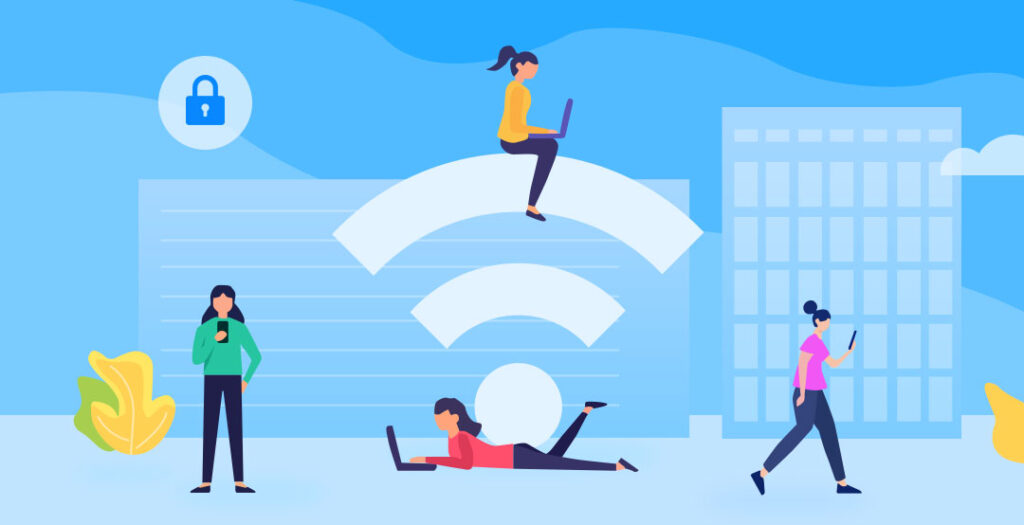How To Safeguard Your Data at Public WiFi?

In this article I will highlight the various methods on how to safeguard your data while using WiFi – But before I dive into this topic, I first want to lay out a little background information on data theft and e-crime. Consequently, in this era of technology, not a week goes by without hearing news about a high-profile case of hacking or data theft. However, most of us should not be stunned about high-profile data breach incidents – a perfect example would be a recent cyber attack on target (a chain of large retail stores). The point is that the individual user is more at risk of being targeted compared to a corporate entity – what’s really a shocker is that your data could be stolen right under your nose – without even getting a whiff of suspicion. So, how does one fall prey to hackers? Well, it’s all about the environment, in which you are using Wi-Fi, whether your Wi-Fi connection is secured or unsecured, and even whether you are surfing the internet in public or in the comfort of your own home – these conditions determine the chances of your data being stolen.
What I primarily want to highlight in this article are the dangers of using Wi-Fi in public, such as in coffee shops, airports, train stations or other places where techies congregate in order to take advantage of free internet. Using a publicly available wireless internet connection may seem like a fairly safe bet – well, at least for those who lack awareness on information security issues – divergent to what you may think, using public Wi-Fi is like diving into shark infested waters. With the sharks being data thieves – what’s even scarier is that you never see these sharks coming – until it’s too late.
All a hacker requires is a tablet computer, capable of connecting to wireless networks – it the hackers equivalency of a fat kid being in a candy store – and we all know how much most fat kids love sugar. The hacker can have his or her pick of the most vulnerable victim, for example: someone with no antivirus and or firewall protection. Although, most of the time, hackers are able gain access to anyone’s PC simply by using sophisticated hacking software – capable of bypassing firewalls and antivirus security. However, not all hope is lost – there is something you can do to defend yourself if you absolutely don’t want give up using public Wi-Fi.

Use a virtual Private Network (VPN):
If you would like to encrypt all your browsing activities, the best way to do it is with VPN. Regardless of which sites you visit, your real information will not be accessible to e-crooks – when an e-criminal tries to access your information, he or she will simply encounter garbled up information – in essence, this information is in encrypted format – which is practically useless for hackers. One of my favourite free VPN service is ultra-surf – its fast and you can carry the self-executable file on a portable drive – giving you the freedom to protect your privacy wherever you go.
Keep your confidential data on encrypted cloud:
Regardless of what you may think, your data is safe in the cloud. Most cloud storage services, such as Microsoft’s One Drive, Google drive, Box and Drop box all encrypt your data which protects them from being accessed – while also giving you the flexibility to expediently access your data from virtually anywhere in the world – given the condition you have access to the internet. However, receptive data that is desktop based should also be guarded with scrutiny – thus, desktop based data encryption software should be utilized which guarantees that your data won’t be compromised in case your PC is stolen.
Handy Tools To Copy Protect Your Data:
In short, today’s age of technology demands you to Safeguard your Data at Public WiFi Hotspots. So that you might feel well secured from any type of hackers or data loss. There are some useful and handy tools out there that can also help you to safeguard your data. One of the most recommended and efficient tool is Copy Protect. You will surely feel much secure after using it.
Ways To Protect My Public Wi-Fi Data
1. Use a virtual private network (VPN). A VPN creates a secure, encrypted connection between your device and the internet, and can help protect your data from being accessed by anyone else on the public Wi-Fi network.
2. Use a secure web browser. Make sure you are using a secure web browser such as Google Chrome or Mozilla Firefox and that you are running the latest version.
3. Use a firewall
Can Someone See What I’M Doing On Their Wi-Fi?
The answer to this question depends on the specific Wi-Fi network in question. Generally speaking, most Wi-Fi networks will allow users to access the Internet using their own devices, such as laptops, smartphones, and tablets. However, some Wi-Fi networks may have restrictions in place that limit access to certain websites or services. Additionally, some Wi-Fi networks may require users to enter a password or other authentication information in order to access the network.
Delete My Public Wifi History
In order to delete your public Wi-Fi history, you will need to access the settings of the Wi-Fi network you are connected to. Depending on the type of Wi-Fi network you are connected to, you may need to access the router’s settings page, or the settings page of the Wi-Fi network itself. Once you have accessed the settings page, you should be able to delete the Wi-Fi network’s history by selecting the “Delete”.
Use VPN Hide History From ISP
Using a VPN can help hide your browsing history from your ISP. A VPN works by encrypting your internet traffic, making it much more difficult for your ISP to track your activity. It also masks your IP address, making it harder for your ISP to identify you.
VPN Safety On Unsecured Wi-Fi
Yes, using a VPN on an unsecured Wi-Fi network is generally safe. A VPN encrypts your data, making it much harder for anyone on the same network to intercept your traffic.
Is Incognito History Saved In Wi-Fi?
No, incognito history is not saved in Wi-Fi. Incognito mode does not store any of your browsing history on the device you are using. However, your ISP and other third-party services may still be able to track your activity.
Hotel Wi-Fi Monitoring Your Are Activity
Yes, hotel Wi-Fi can potentially see what you are doing. Hotels often use unsecured Wi-Fi networks, which means that anyone on the same network can potentially intercept your traffic. It is important to use a VPN when connecting to hotel Wi-Fi to protect your privacy.
Best Way To Protect My Wi-Fi IP Address
The best way to protect your Wi-Fi IP address is to use a virtual private network (VPN). A VPN will encrypt your internet traffic and hide your IP address from anyone who might be trying to track your activity. Additionally, it will also help to protect your data from being intercepted by any malicious actors on the same network.
Can Wifi Owner See My Whatsapp Messages?
No, the owner of a WiFi network cannot see your WhatsApp messages. WhatsApp is an end-to-end encrypted messaging service, which means that only the sender and recipient can see the messages. Even if the WiFi owner was able to intercept your messages, they would not be able to read them.
Best Way To Safeguard Wi-Fi
To safeguard your Wi-Fi, you should ensure that you have a strong password and that you regularly update it. Additionally, you should also make sure that your router is up to date with the latest security patches and that you have enabled encryption for your network.
VPN Protect Data On Public Wi-Fi
Yes, a VPN can protect your data on public Wi-Fi. A VPN encrypts your data and hides your IP address, so that your data is kept secure even when you are using public Wi-Fi.
